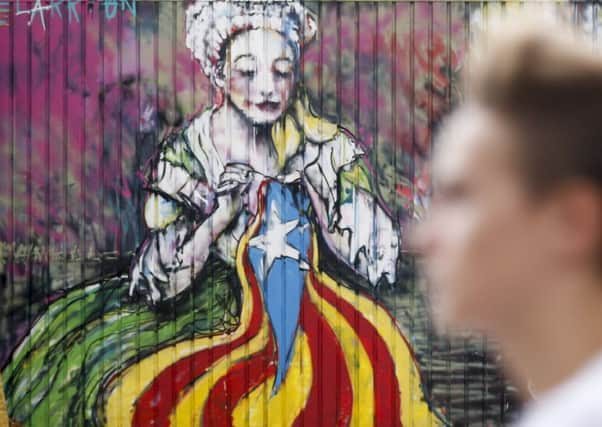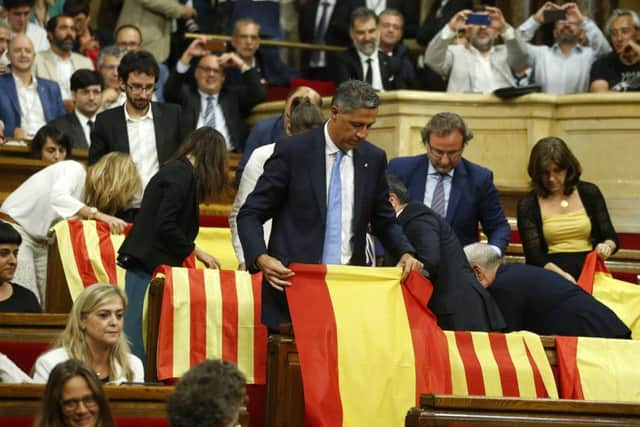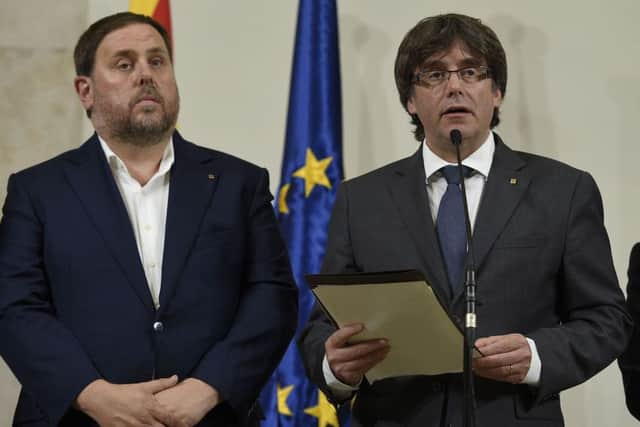Catalonia set to hold binding independence vote in October


Regional President Carles Puigdemont signed a decree that officially calls for a “self-determination referendum of Catalonia” to be held on 1 October.
His entire cabinet, which includes politicians from various pro-independence parties, also approved the document to dilute responsibility in case of prosecution.
Advertisement
Hide AdAdvertisement
Hide AdThe referendum clashes with the Spanish Constitution, which only gives national authorities the right to call such a vote.


But Catalonia’s pro-independence lawmakers approved a bill earlier on Wednesday that is meant to provide a legal justification for the independence vote.
“The concept of a state and patriotic unities that go beyond the rights of citizens don’t have a place in today’s Europe,” Puigdemont said. “Catalonia belongs to this world that looks forward, and that’s why it will decide its own future on the 1 October.”
A central government official told The Associated Press that Spanish Prime Minister Mariano Rajoy has urged the country’s top legal consultative body to review the bill.


The official said Madrid is expected to challenge the law in the country’s Constitutional Court on Thursday.
Catalonia’s renewed push for secession has opened one of Spain’s deepest political and institutional crises of recent years. Although much of the blame has been put on the pro-independence bloc in the regional parliament, Rajoy’s conservative government has been criticized for letting the situation get this far.
Puigdemont’s government claims it has a democratic mandate to seek a binding independence referendum based on the universal right to self-determination. However, approval for the referendum law came after more than 11 hours of heated debate.
Advertisement
Hide AdAdvertisement
Hide AdThe support of 72 pro-independence lawmakers was enough to pass the measure, but 52 opposition members of parliament walked out in protest before the voting started. Eleven lawmakers abstained from voting.


#The parliamentary debate in Barcelona saw tensions flare when the regional body’s top speaker, Carme Forcadell, announced that a vote on the bill would proceed before the legislation had undergone the customary legal vetting. The vote had not appeared on the day’s agenda until the very last minute.
Spain’s public prosecutor announced it was readying legal paperwork to sue the speakers, including Forcadell, for disobeying previous Constitutional Court orders and for abusing power.
Ines Arrimadas, the leader of Ciudadanos (Citizens) -the main opposition party in Catalonia - also announced that she would seek parliamentary support for a no-confidence vote against Puigdemont in an effort to force new regional elections.


Spain’s deputy prime minister made a televised appearance amid the chaos and numerous pauses in the meeting to announce that Rajoy’s government was urging the Constitutional Court to take punitive measures against those who allowed the bill to be debated.
Soraya Saenz de Santamaria said Catalonia’s parliament was holding a “fake debate” that she dubbed as an “embarrassing show” and “a kick to democracy, to Catalans and to political decency.”
The Spanish government is trying to strike a delicate balance between offsetting the secessionist defiance and staying away from more dramatic measures that would further inflame anti-Spanish sentiments, such as suspending Catalonia’s autonomous powers or declaring a state of emergency that would bring the army into the mix.
Advertisement
Hide AdAdvertisement
Hide AdIn a show of political unity at the national level, the leaders of the Socialists and the business-friendly Ciudadanos party held conversations with Rajoy on Wednesday. Both leaders had separate meetings scheduled with the prime minister on Thursday.
The Catalonia region centered on Barcelona generates a fifth of Spain’s gross domestic product. It self-governs in several important areas, such as police, health and education. But key areas such as taxes, foreign affairs and most infrastructures are in the hands of the Spanish government.
Both Catalan and Spanish are spoken in the region of 7.5 million people, and many Catalans feel strongly about their cultural heritage and traditions.
The pro-independence bloc has argued that full control would benefit Catalonia, an idea that gained support in times of high unemployment and harsh austerity measures as a result of Spain’s 2008-2013 financial crisis.
The return to solid growth has weakened public backing for independence, although polls show that almost eight out of 10 Catalans want to have the right to vote.
But a referendum in defiance of Spain’s rule of law, without the blessing of central authorities, has inflamed controversy. Catalan leaders have pledged to proclaim a new republic within 48 hours if the “yes” side wins the referendum, regardless of turnout.
Former Catalan leader Artur Mas said pushing ahead with the referendum was justified because a pro-independence coalition won the 2015 regional election.
Advertisement
Hide AdAdvertisement
Hide Ad“The referendum is what we have to do because we have the mandate of the peoples of Catalonia,” Mas said.
Mas is the highest-ranking among Catalan politicians suspended from office and fined by the country’s Supreme Court for organizing a non-binding vote on independence in 2014.
The yes vote to break away from Spain won at the time amid a low turnout by voters.